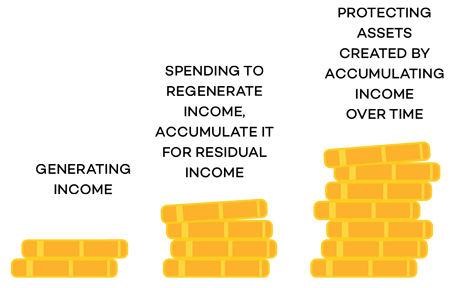CHAPTER 1PERSONAL FINANCE

What is personal finance?
Personal finance is simply all activities of managing your own money. Personal finance activities mainly affect cash inflows (income) and cash outflows (expenses).
Just like a business, an individual or a family (a collection of several individuals) will always have financial activities. These activities revolve around 3 main issues:

However, while businesses have a whole system of bookkeeping, management software, and specialized staff to manage their money, most individuals or small families do not have the necessary background to control their finances in a reasonable manner. Although the size of a family’s assets is usually smaller and the nature of financial management in a family is simpler than that of the business, this should not be disregarded.
If you search the internet using keywords like “building personal finance” or “personal financial management methods”, you’ll quickly find a series of articles with tips for improving personal finance, including saving, cutting your expenses, investing as early and as much as possible, paying off debt, and limiting debt.
THESE TIPS MAY BE CORRECT, BUT IT IS DIFFICULT TO APPLY SUCH GENERAL ADVICE WHEN YOU DON’T KNOW WHERE TO START.
Many people draw up a series of financial plans, only to abandon them because they do not have the patience to stay on track when things change and adjust the plan in line with the actual situation. You cannot take action if you have no knowledge of your present financial position. Ask yourself:
1. How much is your monthly income and where does it come from? What is the total of your investments and are they making a profit or a loss?
2. How much money do you spend monthly? More or less than what you earn?
3. Do you have provisions or insurance to support yourself in case of illness or accident?
Before making your own financial plans, you need to master some basic principles to set up a system of records and statistics of your financial activities to analyze, evaluate, and support decision making. It does not need to be as detailed and complicated as the accounting books of a business, but it must be accurate and clear, and it has to be updated regularly, be it on a daily, monthly, quarterly, or even semi- annual basis.
In the upcoming chapters, we will join Tuan and Mai in learning about consumer credit: how to make the most of our money to avoid financial stress and get more of what we want; how to make borrowing decisions, and how to organize and manage financial items such as generating income, making a budget for loan repayments, spending, saving, investing, and protecting resources over time and for future events.
THIS PROCESS IS ALL ABOUT PERSONAL FINANCIAL MANAGEMENT.